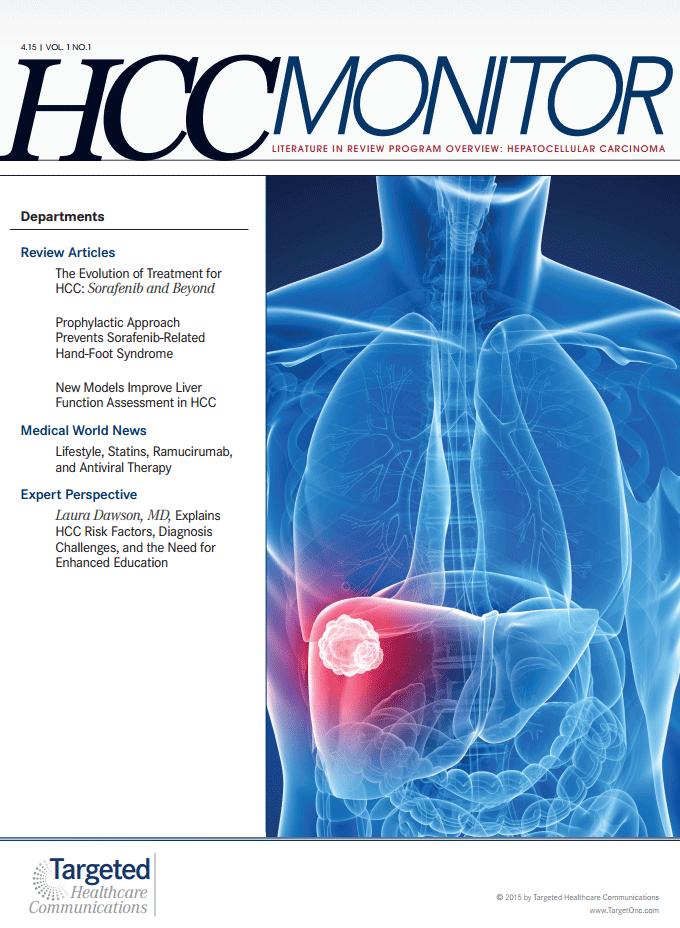Diagnosis, Treatment of HCC Remains Challenging
Laura Dawson, MD, provides insight into the diagnosis and treatment of hepatocellular carcinoma.
Laura Dawson, MD, FRCPC
Hepatocellular carcinoma (HCC) is the most common form of liver cancer and is commonly caused by cirrhosis of the liver and hepatitis infection. HCC is often diagnosed when it is not curable, but can be managed with surgery, radiation, and the tyrosine kinase inhibitor sorafenib.
While advancements have been made regarding the understanding of the molecular features and the management of this disease, challenges remain for primary care physicians, surgeons, radiation oncologists, and medical oncologists. This is becoming increasingly important as evidence supporting a link between obesity and HCC continues to grow, suggesting more patients could soon be diagnosed with this disease.
To gain insight into the diagnosis and treatment of HCC,HCC Monitorinterviewed Laura Dawson, MD, FRCPC, a professor in the Department of Radiation Oncology at the University of Toronto.
HCC Monitor: What are some of the challenges with diagnosing and screening for HCC?
Dawson: There are many challenges associated with the treatment of HCC from start to finish. There are challenges with screening, treatment decision, the actual treatment, and even palliative care.
Screening is one of the biggest challenges. A large proportion of patients, unfortunately, are not screened and present with locally advanced disease. Sometimes, these patients don’t even get a chance to receive treatment for their disease because they’re already too sick.
Screening is strongly recommended for high-risk patientsto try and detect the cancer at an early stage. However, uptake has not been good in some countries. There is a very strong need to educate physicians, as well as patients—if they have a high-risk status such as Hepatitis B or known cirrhosis, they could enter a screening program that may increase the chances of detecting cancer earlier. Despite the screening we have available now, many cancers present outside the early stage and are a challenge to treat.
How could a patient’s alcohol abuse affect treatment?
One of the main causes of cirrhosis, at least in North America, is related to alcohol consumption. Heavy alcohol use can lead to injury to the liver, scarring, fibrous, and then ultimately cirrhosis. With a cirrhotic liver, the chances of developing HCC or other liver cancers are increased. Alcohol use is a modifiable risk factorone that patients could actually control. It’s well known that smoking causes cancer, but alcohol, too, can directly lead to an increase risk of liver cancer.
What are the unmet needs in hepatitis B and HCC?
Patients with hepatitis B and HCC represent a group with more than just cancer to treat. Because of this, it is absolutely vital that these patients go to a multidisciplinary team. All members of the team must be involved in each treatment decisionthese patients have fragile livers and certain therapies could push liver function over the edge and lead to toxicity.
For patients with hepatitis B, having a hepatologist involved in treatment and support is very important. The oncology team should work with the hepatologist to determine the safest plan of action, so that the patient is not at high risk for toxicity or a decline in liver function.
How would you suggest practitioners educate patients about hepatitis B and HCC?
There are different patient groups who have viral hepatitis and depending on their situation, they may be less or more aware of the risk factors. Family doctors, of course, should be aware of screening, education, and primary prevention.
In terms of patients coming into the clinic with HCC, it is very important to treat the hepatitis B and/or C. This is done, not just to prevent reactivation of hepatitis, but also to help decrease the risk of the liver becoming more cirrhotic and the risk of other HCCs developing. There is more than one reason to ensure patients are adequately treated with antivirals.
Do you have any final thoughts about HCC?
Non-alcoholic hepatitis or non-alcoholic fatty liver disease can lead to cirrhosis. In fact, there is quite a lag time from the time that patients who may have metabolic syndrome ultimately develop fatty liver and ultimately cirrhosis.
In the future, we are going to continue to see it increase in the incidents of mortality from HCC. This area should absolutely be a priority cancer for treatment, screening, and working together to improve outcomes. This is something that’s also modifiable, but it is very difficult to change peoples’ habits. I hope that it will become something that the primary level of family doctors would also be aware of and talk to their patients.
I remember a time that HCC or liver cancers were of little interest to physicians or granting agencies. Liver cancer is now the number one increasing cause of cancer mortality in North America and it is very clearly an important cancer in Asia and other countries endemic in viral hepatitis.
Video Viewpoint
Screening and Prevention of HCC
More patients are going to be affected by this disease and there remains a need to improve outcomes. There are trials that are ongoing. These trials are challenging to complete but they are important to help us move forward.
There also is a need to enrich patient populations. It’s possible that patients with hepatitis B have a slightly different genomic makeup than other patients who develop HCC. I hope that we will have information that may help us better treat patients in the future and not treat everybody with the same strategies. There is one systemic therapy, sorafenib, that is approved for first-line and, despite many trials, there has not been significant advances from that one therapy. We need to do a lot better than what we are doing now.

Survivorship Care Promotes Evidence-Based Approaches for Quality of Life and Beyond
March 21st 2025Frank J. Penedo, PhD, explains the challenges of survivorship care for patients with cancer and how he implements programs to support patients’ emotional, physical, and practical needs.
Read More